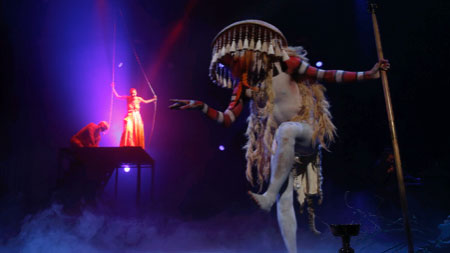Message from Executive Director Sachio Ichimura
Take Off and Step Over: Towards the Newcomers
Sachio Ichimura
Executive Director, Festival/Tokyo 2018
For a long time, I have been obsessed by a hope that portrays the society two or three decades hence when the people today in their twenties and thirties will take on central roles. What kind of art will they produce? Since I became director, I have programmed Festival/Tokyo in ways that present this kind of art at the fore. We now seem to be at a place where we can present something of the actual image of these “newcomers.” Of course, it is not the case that the F/T programs are only organized according to this intention. Art is very good when it comes to this in that even if departing from this intention, many works can provide relief by nonetheless invoking an emotional response and “bravo” from the audience. This is the last time I will be involved with the programming for F/T, so I am truly looking forward to the signposts in the programs created by the next directors.
After becoming director, I programmed according to five themes across two patterns: “Border Play,” “Border Fusion,” “Beyond Borders: Towards the Newcomers,” “Newcomers, Towards a Big Place,” and now “Take Off and Step Over: Towards the Newcomers.” In terms of the programming, I made two series. The first was the Asia Series and the second was the F/T in the City Performance Series. In addition, Asian works have become the main part of the program since the 2017 festival. In a sense, this might evoke the stagnation of the European performing arts scene. The F/T in the City Performance Series does not set out to create a theatre space in the streets. Rather, its premise is to create works that cannot fit into a theatre space. Put differently, it means that even for works founded in language, many works are created that do not require the category of “theatre.” However, while developing these two series, our limits already became clear, and the next directors will surely bring new ideas in order to overcome these.
In terms of details regarding where these limits lie, I hope to explain more at the various symposia and talks that will be held at F/T18. Herein also surely lies the problem of how we can get beyond the format of F/T.
At the core of this year’s program is this theme of “Take Off and Step Over: Towards the Newcomers,” meaning we should step (rather than trample) and leap over. I think this is a way of creating a new age distinct to the “newcomers” as well as a new way of creating art, when the question of whether or not it is art ceases to be significant.
“Newcomers” are appearing all over the world. For example, in Europe, no doubt a typical example would be the people who were either still infants or were born after the fall of the Berlin Wall. In Asia, for instance, it might be the people who never experienced the Vietnam War, or those for whom the Internet had existed since the time they were born and whose “common inexperience” includes not having had contact with the socialist bloc or Cultural Revolution. I think of them as the ultimate nomads. The online world has fundamentally overturned the concepts of place or community as reliant on a place. Put another way, the appearance of reality has changed, or, put yet another way, it is a way of living in a world where there is neither war nor peace. The question of what kind of art exists in this time is something else that I hope to discuss at talks during the festival.
In closing, I would like to sound just one warning. This is that almost no people are being cultivated at the sites where art is produced. This is not only production at concrete sites but also the same for dramaturges and artistic directors. A large factor for this lies in education, though the system of mid-career recruitment, which wants just fixed-term employment and immediate fighting potential for the time being, carried on these past ten and more years by the art world, in particular by public agencies, has meant that we have completely ceased to foster capable human resources. Can people employed for fixed terms guaranteed for only three to five years really think seriously about the future of the organization? What is important most of all is sparing no effort in recruiting and cultivating proficient people, both the newly graduated and those who graduated some time ago. Expectation fosters, so disposing of them is the worst thing we can do. No doubt there is no need to say this at such a late stage, but the new directors to whom I have now handed over the reins will themselves perhaps pass on the baton to others in six or seven years’ time, though if this situation is allowed to continue, we won’t be able to find anyone suitable to come next.
Along with taking an interest in the F/T program this year, I hope you will continue to watch how the festival develops in the future.
June 5, 2018

サブタイトル
デフォルトテキスト(13pt、ウェイト300)1985年北京生まれ。2009年セントラル・セント・マーチンズを卒業。10年チェルシー・カレッジ・オブ・アート修士課程終了。現在は北京を拠点に、ダンサーやミュージシャン、フランスのアートグループなどとのジャンルを超えた協働作業を続ける。17年にはウィーン芸術週間やドイツの世界演劇祭へも招聘されているなど、世界的なアーティストとして注目されている。 1985年北京生まれ。2009年セントラル・セント・マーチンズを卒業。10年チェルシー・カレッジ・オブ・アート修士課程終了。現在は北京を拠点に、ダンサーやミュージシャン、フランスのアートグループなどとのジャンルを超えた協働作業を続ける。17年にはウィーン芸術週間やドイツの世界演劇祭へも招聘されているなど、世界的なアーティストとして注目されている。17年にはウィーン芸術週間やドイツの世界演劇祭へも招聘されているなど、世界的なアーティストとして注目されている。1985年北京生まれ。2009年セントラル・セント・マーチンズを卒業。10年チェルシー・カレッジ・オブ・アート修士課程終了。現在は北京を拠点に、ダンサーやミュージシャン、フランスのアートグループなどとのジャンルを超えた協働作業を続ける。17年にはウィーン芸術週間やドイツの世界演劇祭へも招聘されているなど、世界的なアーティストとして注目されている。 1985年北京生まれ。2009年セントラル・セント・マーチンズを卒業。10年チェルシー・カレッジ・オブ・アート修士課程終了。現在は北京を拠点に、ダンサーやミュージシャン、フランスのアートグループなどとのジャンルを超えた協働作業を続ける。17年にはウィーン芸術週間やドイツの世界演劇祭へも招聘されているなど、世界的なアーティストとして注目されている。17年にはウィーン芸術週間やドイツの世界演劇祭へも招聘されているなど、世界的なアーティストとして注目されている。